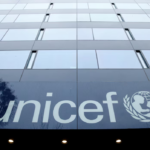
The United Nations International Children’s Emergency Fund (UNICEF) has expressed strong confidence in Ghana’s commitment to achieving the Sustainable Development Goals (SDGs) by 2030, praising the country’s Budget execution and tracking system.
At the launch of Ghana’s 2023 SDG Budget and Expenditure Report, UNICEF said the accountability system—adopted by only a few countries worldwide—positions Ghana among global leaders in transparent SDG investment tracking.
The budget execution report revealed that Ghana increased its SDG-related spending from GH₵83 billion in 2022 to GH₵180 billion in 2023, representing a significant commitment to advancing targets across health, education, social protection, and human capital development.
“There are very few countries that have been brave enough to take this step to really have this kind of accountability tool in place. It’s laudable that the Ministry of Finance is a frontrunner in this,” said Ms Paulina Sarvilahti, Chief of Social Policy and Inclusion at UNICEF Ghana.
Rankings from the Sustainable Development Report on the performance of all 193 UN Member States place Ghana 120th globally in overall SDG achievement. However, Ms Sarvilahti expressed optimism about Ghana’s efforts to fast-track progress.
“Ghana’s data-driven approach provides a solid foundation for accelerated progress. Overall, it’s great that we have this strong commitment from the government and that there is really a strong push towards that,” she stated.
She acknowledged that multiple global crises—climate change, economic pressures, and the aftereffects of the pandemic—have made achieving SDG targets more challenging for nations worldwide. She noted that Ghana’s unique approach to monitoring whether resources are reaching the right beneficiaries would be a catalyst for meeting its targets.
The UNICEF official highlighted the country’s progress in education, gender-related investments, and poverty reduction with a focus on social protection interventions, and particularly praised the report’s inclusion of child-specific indicators for the first time.
She called for more integrated planning, efficient resource allocation, and stronger collaboration between government and development partners, as well as targeted interventions that maximise return on investment.
“Ghana’s commitment to generating and using data to guide policy decisions and budget allocations… We cannot stop. This is the time we need to really put in more effort and be more decisive, more targeted,” Ms Sarvilahti said.
UNICEF’s Country Representative, Mr Osama Makiawi Khogali also commended Ghana for being the first country to ratify the Convention on the Rights of the Child in 1990 and the progress made since then.
He, however, urged for more action on poverty reduction, noting that 73 per cent of Ghanaian children are still affected by multidimensional poverty, with 28 per cent facing monetary poverty.
He emphasised the significance of the call as Ghana joined the global community to observe World Children’s Day, which coincided with the launch of the SDG report, adding that targeted investments in the SDGs are crucial for accelerated progress and the achievement of the goals.
Mr Isaac Fraikue, Director of Budget at the Ministry of Finance, expressed confidence that Ghana will meet its SDG targets by the 2030 deadline, emphasising that tracking the goals has become an integral part of government operations.
He explained that the SDG report enables timely corrective measures, saying, “We will definitely meet the targets by the time they are due because we’re working so hard as a country.”
“Developing the report is more than just tagging and tracking budgetary applications and associated expenditures. It tells the story of Ghana’s development journey, reflecting our resolve to ensure that no one is left behind whilst aligning our national priorities with a shared global vision for a better future,” he said.
Mr Fraikue added that, moving forward, the country will focus on localising the SDG budget and expenditure reports and deepening engagement with stakeholders to enhance transparency and accountability, while harnessing data to guide financial decisions.